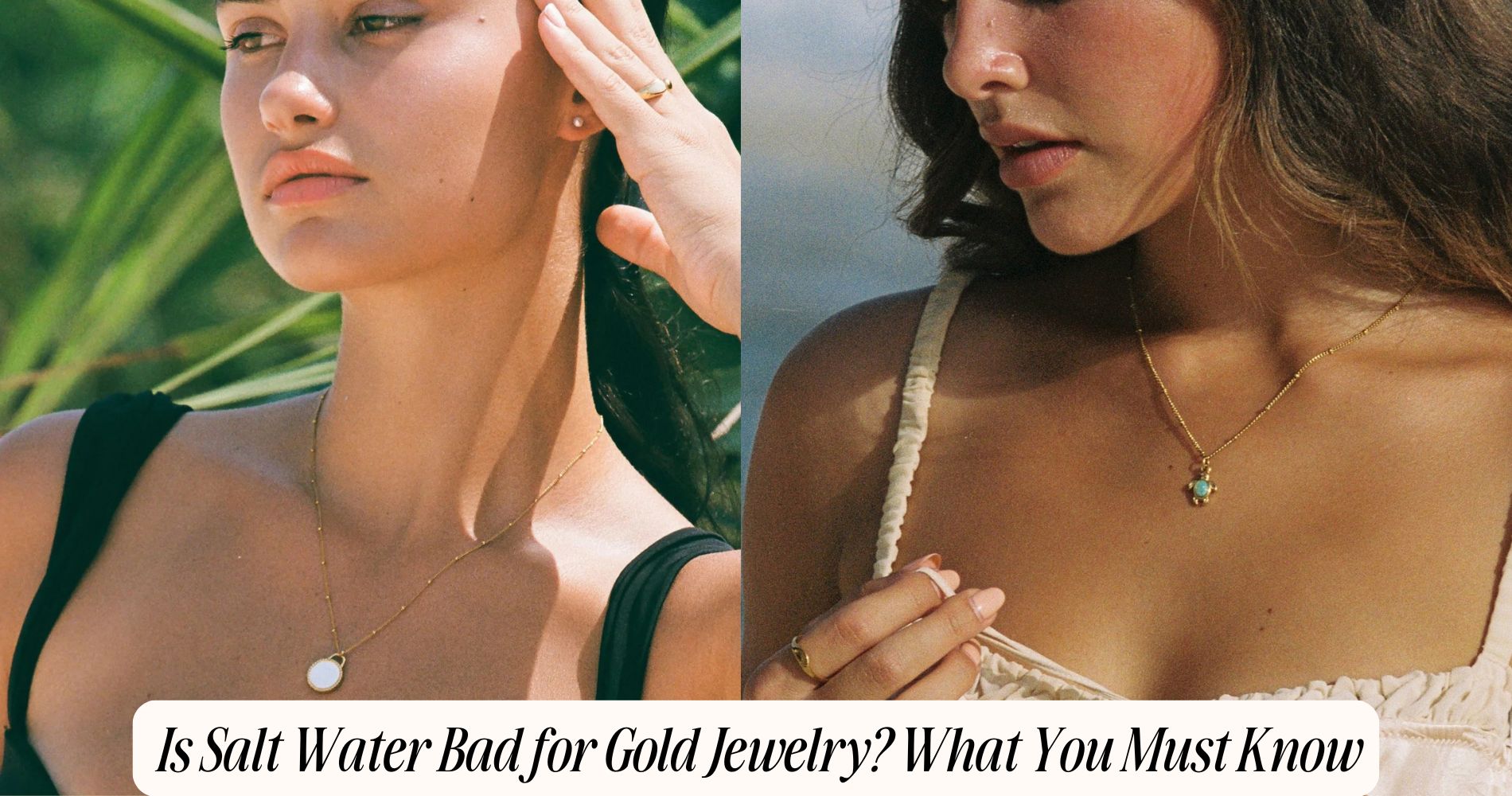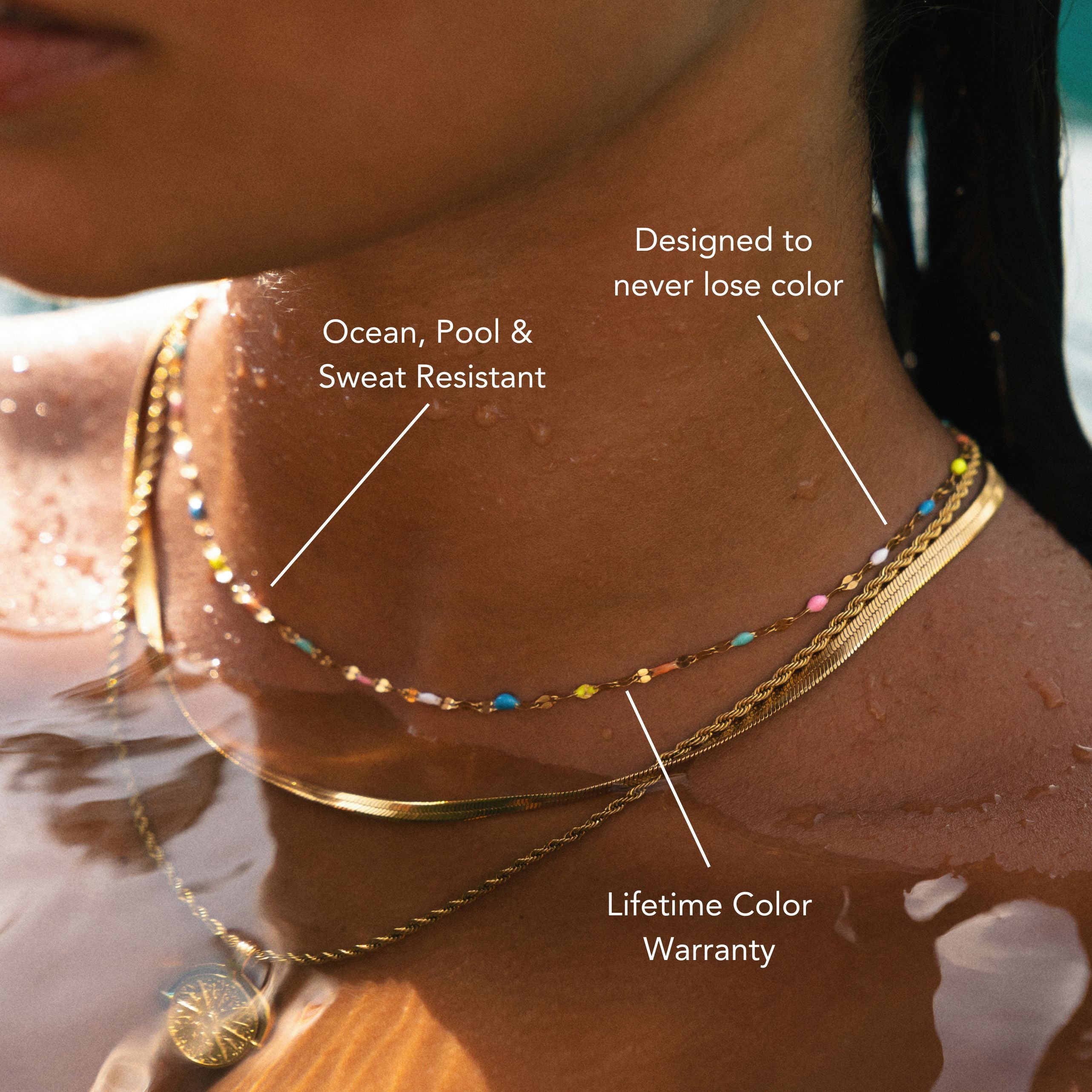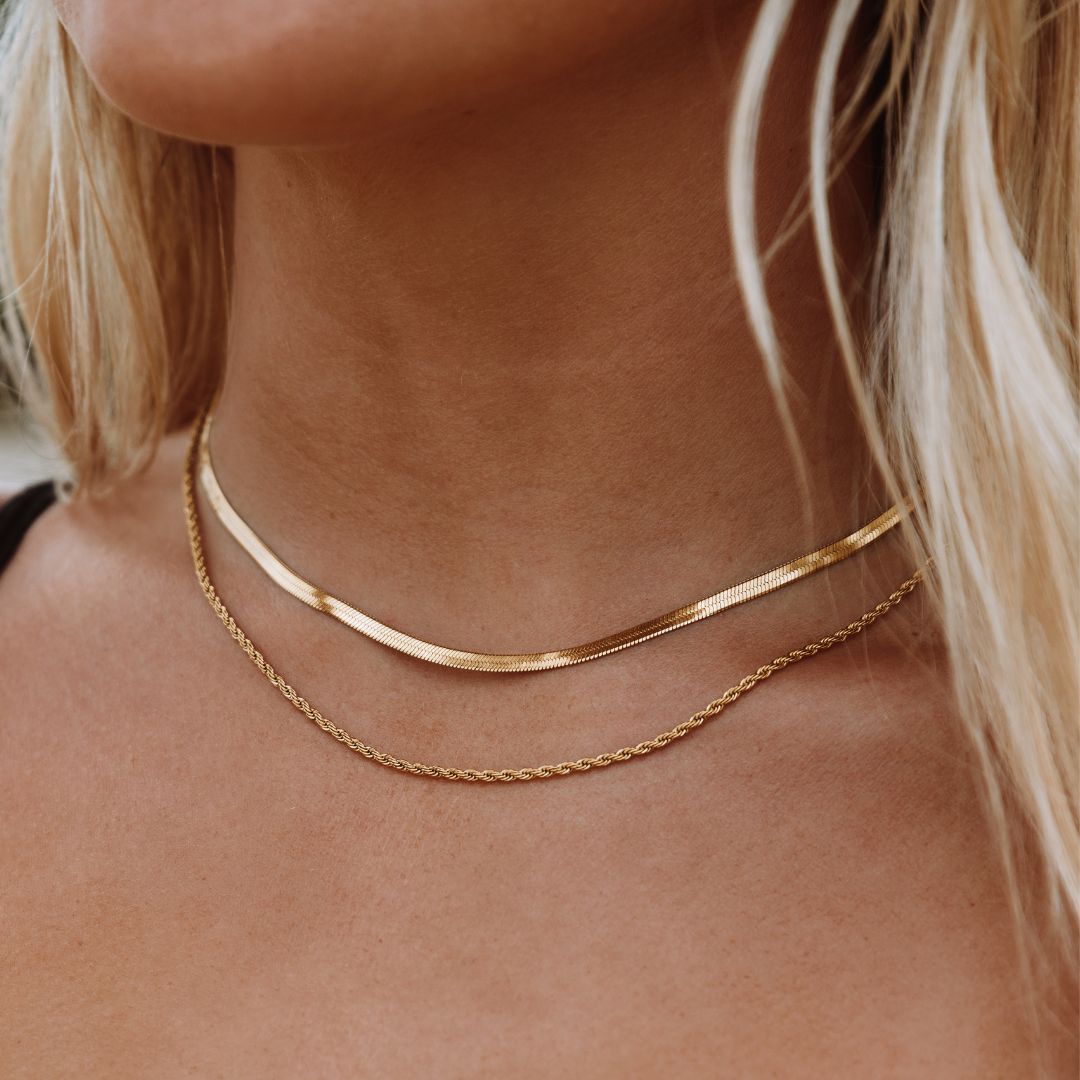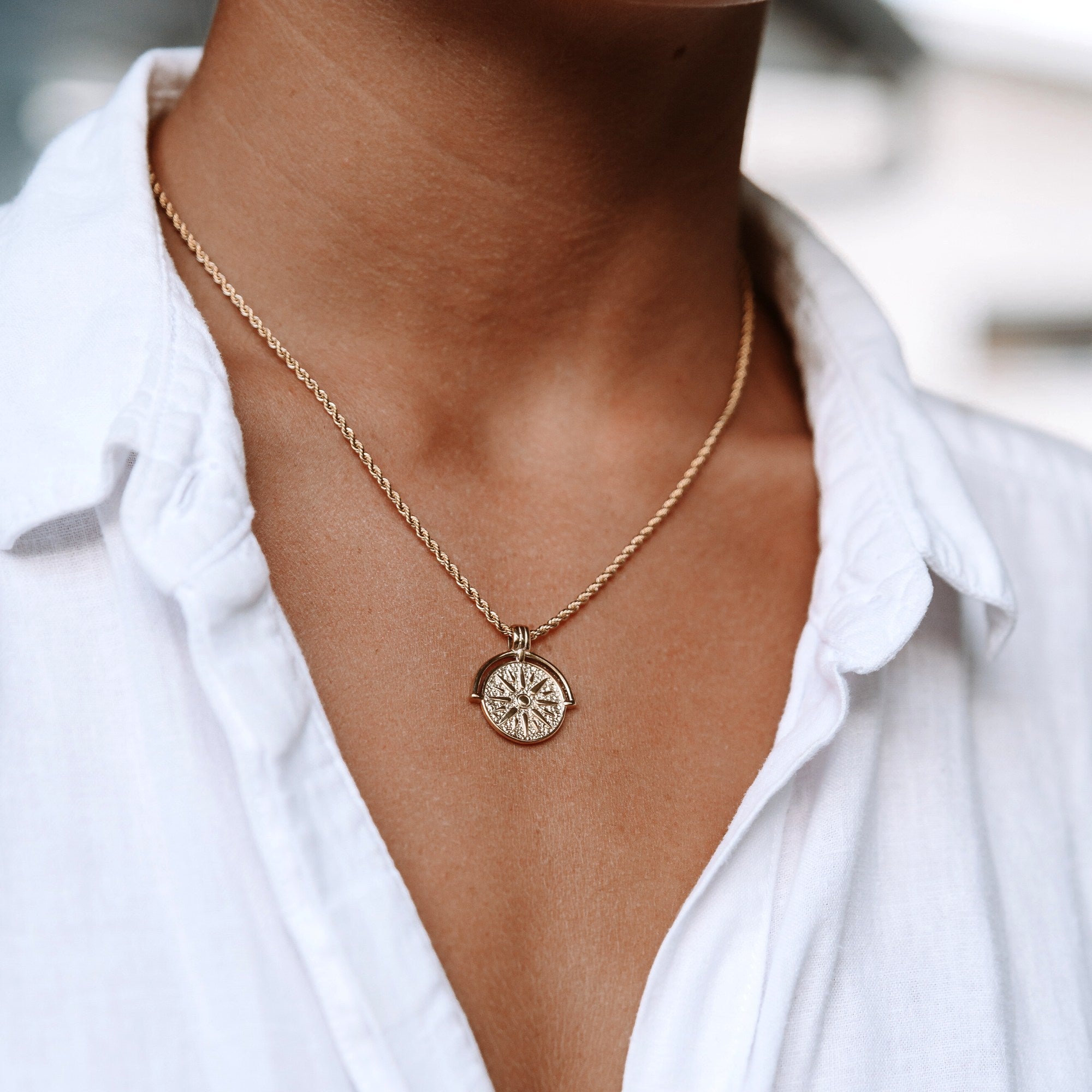
Is Salt Water Bad for Gold Jewelry? What You Must Know
Is salt water bad for gold jewelry? The short answer is yes—especially if the gold contains alloys like copper or silver, which are more prone to corrosion. Prolonged exposure can lead to tarnishing and even structural damage. While higher karat gold is more resistant to corrosion, it’s not completely immune. To keep your pieces looking their best, rinse them with fresh water after beach visits and avoid wearing delicate items in the ocean. If you love coastal vibes, explore our gold beachy jewelry collection for styles made to shine by the sea.
Understanding Gold Alloys and Their Composition
Gold jewelry often contains alloys that impact its durability and appearance. The gold composition typically includes a mixture of pure gold and various alloy types, such as copper, silver, or palladium.
These alloys not only enhance the strength of the jewelry but also modify its color and finish. For instance, adding copper creates rose gold, while silver results in a lighter hue.
The karat system measures the gold content; for example, 14k gold consists of 58.3% pure gold, making it more durable than 24k gold, which is pure but softer.
Understanding these alloy types helps you choose jewelry that suits your style and lifestyle, ensuring longevity and maintaining its aesthetic appeal.
How Salt Water Affects Gold Jewelry
While you might enjoy wearing your gold jewelry at the beach, it's important to understand how salt water can impact its condition.
Saltwater corrosion can occur when your jewelry comes into contact with saltwater, especially if it contains alloys like copper or silver. These metals are more susceptible to corrosion, leading to tarnishing and damage over time.
The harsh environment can also trigger alloy reactions, which may weaken the structure of your gold pieces. Even if your jewelry is high-karat gold, regular exposure to salt water can still affect its appearance and integrity.
To keep your gold jewelry in prime condition, rinse it with fresh water after swimming and dry it thoroughly to minimize any potential damage.
The Role of Gold Purity in Durability
Understanding the purity of gold is essential to evaluating its durability, especially when exposed to harsh environments like salt water. Gold purity is measured in karats, with 24K representing pure gold. Higher purity levels typically enhance durability factors, making the jewelry more resistant to corrosion and damage.
However, purer gold can be softer and more prone to scratching, which might affect its overall longevity. Conversely, lower karat gold, such as 10K or 14K, contains alloy metals that provide extra strength and resilience against wear and tear.
When you're considering gold jewelry for use in salt water, it's vital to balance purity and durability to guarantee your pieces remain beautiful and intact over time.
Signs of Damage From Salt Water Exposure
Salt water can wreak havoc on gold jewelry, often leaving behind noticeable signs of damage. When you expose your gold pieces to salt water, the first thing to look for is corrosion.
Identifying corrosion may present as rough patches or a dull surface, indicating the metal is suffering from the harsh environment. Additionally, you should be vigilant about spotting discoloration. This can appear as yellowing or a change in hue, suggesting the gold alloy is reacting with the salt.
If you notice these signs, it's essential to take immediate action. Cleaning your jewelry promptly can help mitigate further damage, preserving both its beauty and value. Regular checks can guarantee your pieces remain in the best condition possible.
Best Practices for Wearing Gold Jewelry at the Beach
When you plan a day at the beach, it's important to contemplate how to protect your gold jewelry from potential damage.
To guarantee beach safety, consider leaving your most valuable pieces at home or securely stored in a jewelry storage pouch. If you decide to wear gold jewelry, opt for simple, durable items that can withstand sand and salt exposure.
Avoid wearing delicate chains or intricate designs, as these can get snagged or tarnished. When swimming, remove your jewelry to minimize exposure to salt water.
Finally, always have a designated spot for storing your jewelry while you're on the beach, so it doesn't get lost or damaged. Following these best practices will help keep your gold jewelry looking its best.
Cleaning Gold Jewelry After Salt Water Exposure
After spending a day in the ocean, it's crucial to clean your gold jewelry to prevent salt water damage.
Start by rinsing your jewelry in fresh water to remove any salt residue. Use a soft brush, like a toothbrush, to gently scrub intricate areas, ensuring you don't scratch the surface.
For a deeper clean, mix mild soap with warm water and soak your jewelry for a few minutes. Afterward, rinse thoroughly and dry with a soft cloth.
Regular cleaning methods like this not only maintain your jewelry's shine but also extend its lifespan. Incorporating these practices into your jewelry maintenance routine will keep your gold pieces looking pristine and help avoid potential damage from salt exposure.
Preventive Measures to Protect Your Jewelry
To safeguard your gold jewelry from the damaging effects of salt water, take proactive steps before heading to the beach or pool.
First, consider using preventive storage; keep your jewelry in a soft pouch or a lined box to avoid scratches and damage.
Before exposing your pieces to salt water, apply a protective coating specifically designed for gold. These coatings create a barrier against corrosion and tarnishing, ensuring your jewelry remains in excellent condition.
Additionally, remove your gold jewelry before swimming or engaging in water activities.
Common Myths About Gold Jewelry and Salt Water
Are you unsure about the impact of salt water on your gold jewelry? You're not alone. There are several prevalent jewelry misconceptions that need myth debunking.
For instance, many believe that salt water tarnishes gold, but pure gold is resistant to corrosion. However, gold-plated or gold-filled pieces can suffer damage due to their base metals.
Another common myth is that exposure to salt water will weaken gold jewelry; in reality, gold's durability remains largely intact. Yet, it's vital to rinse your jewelry after contact with salt water to avoid residue build-up, which can affect appearance.
Understanding these myths helps you make informed decisions about caring for your precious pieces while enjoying your time near the ocean.
When to Seek Professional Cleaning Services
Knowing how to care for your gold jewelry is important, especially after exposure to elements like salt water. If you notice discoloration, tarnishing, or a dull finish, it's time to contemplate professional cleaning services.
Regular jewelry maintenance can help prevent these issues, but if your items require more than a simple cleaning, don't hesitate to seek expert help.
Professional services can safely restore the luster and shine of your gold pieces without causing damage. Furthermore, if your jewelry features intricate designs or embedded stones, a professional can guarantee they're cleaned properly.
Long-Term Care Tips for Gold Jewelry
While you might enjoy wearing your gold jewelry daily, proper long-term care is crucial to preserve its beauty and integrity.
To keep your pieces looking their best, consider effective storage solutions. Always store your gold jewelry in protective pouches or soft cloth bags to prevent scratches and tangles. Avoid placing multiple pieces in one container, as this can cause damage.
When you're not wearing your jewelry, keep it in a cool, dry place away from direct sunlight. Regularly clean your gold pieces with a soft cloth to remove oils and dirt.
Finally, avoid exposing your jewelry to harsh chemicals, including salt water, to maintain its shine and durability. Following these tips will guarantee your gold jewelry remains stunning for years to come.
Frequently Asked Questions
Can Salt Water Tarnish Other Metals in Gold Jewelry?
Yes, salt water can cause metal tarnishing in gold jewelry. The salt water effects can lead to oxidation or corrosion in other metals, diminishing the overall appearance and integrity of your jewelry over time.
Is It Safe to Swim in Salt Water With Gold-Plated Jewelry?
When swimming, gold-plated jewelry isn't the safest choice. Saltwater can wear down the plating over time, leading to tarnishing. To preserve your jewelry's appearance, consider removing it before diving into the ocean.
How Often Should I Clean My Gold Jewelry After Salt Water Exposure?
After salt water exposure, you should clean your gold jewelry immediately. Regular cleaning techniques, like gentle washing with mild soap and water, help maintain its shine and prevent damage, ensuring effective jewelry maintenance for long-lasting beauty.
Does Salt Water Affect Gemstones in Gold Settings?
Saltwater can negatively impact gemstone durability, causing damage like scratching or cloudiness. It's crucial to rinse your gemstones after exposure and clean them regularly to maintain their brilliance and prevent long-term saltwater effects.
Can Salt Water Cause Allergic Reactions to Gold Jewelry?
Salt water itself doesn't typically cause gold allergies, but it can lead to skin irritation for those sensitive to certain metals in jewelry. Always rinse your jewelry after exposure to avoid potential discomfort or allergic reactions.
Conclusion
Ultimately, while gold jewelry is generally resistant to tarnish, salt water can still cause damage, especially if your pieces contain alloys. To protect your investment, avoid wearing gold jewelry in the ocean and rinse it with fresh water after exposure. Regular cleaning and proper storage can help maintain its shine and integrity. By following these best practices, you can enjoy your jewelry for years to come without the worry of salt water damage.























Leave a comment
This site is protected by hCaptcha and the hCaptcha Privacy Policy and Terms of Service apply.